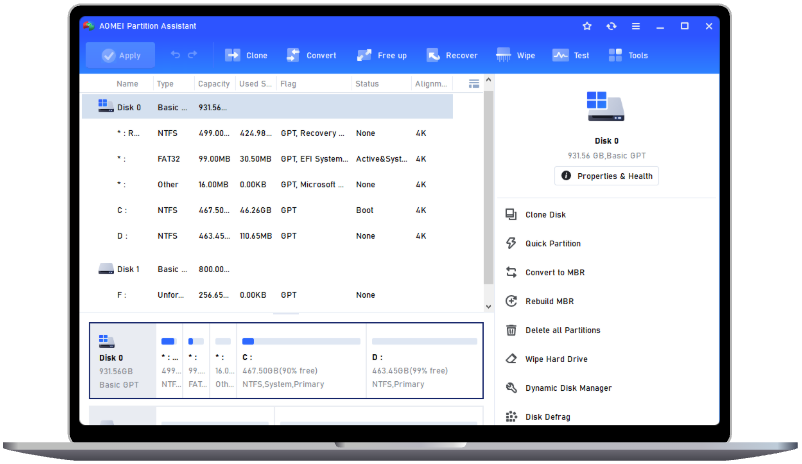HDD Versus SSD Performance: Which One Should I Choose?
If you want to know HDD versus SSD performance, you can read this passage for reference. With SSD vs HDD speed comparison and explanation, it is easy to choose an appropriate disk.
If you've bought a laptop recently, it probably has a speedy solid-state drive (SSD) for fast booting and an HDD for main storage. But if you have to choose between the two, how do you decide? Let's explore the performance differences between SSDs and HDDs and go over the selecting suggestions to help you make the right choice.
HDD versus SSD performance comparison
In this part, we will do HDD speed vs SSD explanation. To help you better understand the two disk, let’s begin by the differences between them.
The differences between HDD and SSD
▌SSD: These use flash-based memory, eliminating any moving parts. They shine with faster read/write speeds, offering quick data access. Generally, they are widely used in gaming and handling substantial data loads. However, they often come at a higher cost per gigabyte compared to HDDs.
▌HDD: On the other hand, HDDs rely on spinning magnetic media and a read/write head. While they have a lower cost per gigabyte, they generally provide slower read/write speeds. So, it HDDs are frequently used in simple task handling and employed as storage devices for accommodating extensive volumes of data and numerous files.
Comparison for SSD vs HDD performance
When we talk about how well a storage device works, we're basically looking at how fast it can read and write data. To help you easily understand this, let's use a car analogy as an easy case to explain the main indicate in the performance of SSD vs HDD — sequential/random read-write speeds.
When you're putting new data on the drive it's called writing. This is when you carry out operations such as saving a new file, or modifying an old one. Reading, then, is when you access that data. This can be to open a text document, a photo, a program, or whatever else is stored on your drive. If you want to know the specific data of your disk, you can do a hard drive read-write speed test.
▌Sequential read-write speeds: If you mostly work with large files on your PC as a single user, it's important to consider sequential performance.
It's like a car on a straight road, checking how quickly it can do big tasks like copying large files. We measure this in MB/s (like a speedometer). SSDs are high-performance sports cars, with no moving parts and lightning-fast read/write speeds, ideal for speedy tasks.
So, SSDs are like fast sports cars here. HDDs are reliable family cars, offering ample storage at a lower cost per gigabyte, suitable for more budget-conscious needs. are slower, like heavy trucks on a bumpy road.
▌Random read-write speeds: For most people, will pay attention to random performance. It's because random performance better matches how we typically use our computers each day. This includes tasks like opening files, running programs, and doing multiple things at once, which are common activities for many computer users.
This is like a car weaving through a busy city, important for everyday tasks like gaming or finding small scattered files. We measure this in IOPS (how many times it can do things in a second). Singly comparing their speed, SSDs are like nimble cars in the city, while HDDs are sluggish, like trucks struggling in traffic.
Indeed, in a speed comparison, SSDs clearly outperform HDDs. However, much like different cars are designed for various purposes, choosing between them depends on your specific needs. If you require ample storage capacity, HDDs are the better choice. SSDs and HDDs each have their unique strengths and are selected based on particular tasks and personal preferences.
Who should choose an HDD or SSD?
After knowing HDD speed vs SSD, if you're still struggling to decide between an HDD or SSD, here are some helpful recommendations:
Who should pick an HDD?
Media lovers and heavy downloaders: If you collect many videos and need vast storage, HDDs offer affordability and spaciousness, going up to 8TB or more.
✔ Budget shoppers: For those watching their wallet closely, HDDs are the way to go. They provide ample storage without straining your finances, unlike the pricier SSDs.
✔ Graphic designers and engineers: Professionals working with videos and photos tend to gobble up storage fast. When it's time to expand, HDDs usually offer a more budget-friendly solution than SSDs, although the price gap is shrinking.
✔ General users: It hinges on your habits. If you enjoy downloading or hoarding lots of media files locally, HDDs are the go-to for accommodating extensive collections of videos and music. However, if you predominantly stream content online, consider investing in a smaller SSD for smoother performance.
Who should choose a SSD?
Frequent travelers: If you're constantly on the move and sometimes close your laptop in a hurry, SSDs provide reliability and protect your data in these unpredictable situations.
✔ Speed enthusiasts: If you crave a blazing-fast computer, lean towards SSDs. They deliver swift boot-ups and rapid app launches, perfect for those who demand immediate task completion. If you require more storage, you can complement an SSD with additional storage options.
✔ Graphic designers and engineers: While we mentioned HDDs earlier, the speed of an SSD can significantly elevate productivity for professionals in these fields. SSDs are an excellent choice, especially when used alongside other storage solutions.
✔ Audio professionals and musicians: When recording or mastering music, the silence of an SSD is preferable to the noise generated by a hard drive. This ensures top-quality sound recordings.
Easily replace your hard drive between HDD and SSD
Whether you're upgrading to an HDD or an SSD, transferring your existing data to the new disk can be a cumbersome task. Choosing the Clone Disk feature of AOMEI Partition Assistant Professional can simplify the process of moving everything from your old disk to a new HDD or SSD, including programs, files, videos, and even the operating system.
With the two cloning methods provided, you can choose the one that best suits your needs, regardless of storage differences. You can even clone a large disk to a smaller one with ease.
- Two cloning methods:
- “Clone Disk Quickly” only copies the used sectors to the destination location, allowing the target disk smaller than the total size of the source disk.
- “Sector-by-Sector Clone” will copy all sectors to the target disk, so the destination disk must be equal to or larger than the source disk.
Before you clone the SSD to the new drive, you must do the following preparation or the clone task will be failed.
✐ If you have a laptop, you must prepare a SATA to USB cable to connect the SSD to it; if your PC is a desktop, you can install the new hard drive directly.
✐ To properly identify the new disk, it's important to initialize it first and ensure that the partition style of the new hard drive matches that of the old hard drive.
✐ The capability of the new drive must be larger than the used space of the SSD.
Step 1. Install and launch AOMEI Partition Assistant, click "Clone" in the main interface and select "Clone Disk".
Step 2. Choose the hard disk that you need to clone as the source disk and click "Next".
Step 3. Select the destination disk to store the data on the source disk, and then click "Next".
Step 4. Then, you can check the source and destination disk in the next window or change to “Sector to Sector clone”, and click the "Confirm" button to continue if there is no problem.
Here, you can also click the "Settings" button to adjust the partition size on the destination disk or tick "4k alignment" to improve the reading and writing speed of SSD if the target disk is an SSD drive.
Step 5. At last, click "Apply" and "Proceed" in the main interface to start cloning the hard drive.
Note: After successfully replacing the new disl to another hard drive, kindly please change the boot drive to boot Windows from that.
To sum up
Exploring HDD versus SSD performance can help you better choose a suitable disk. No matter which disk you finally choose, AOMEI Partition Assistant is a reliable tool for data transferring. What’s more, after changing disk, it will continue to share a hand for your computer management. You can use it to manage drive space, migrate OS only, or convert system disk between MBR/GPT. If you are Windows Server users, you can choose the Server Edition for compatibility.


